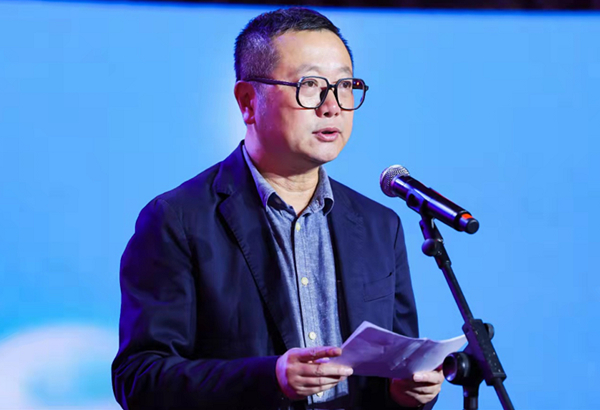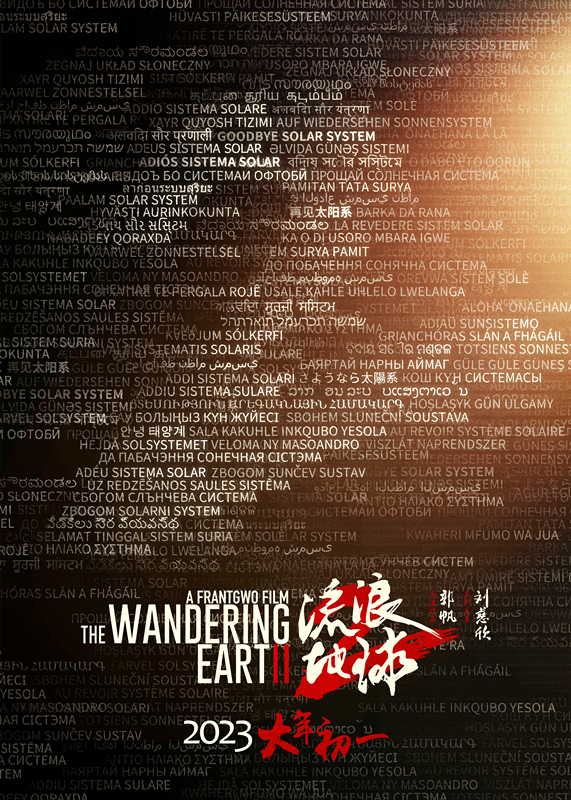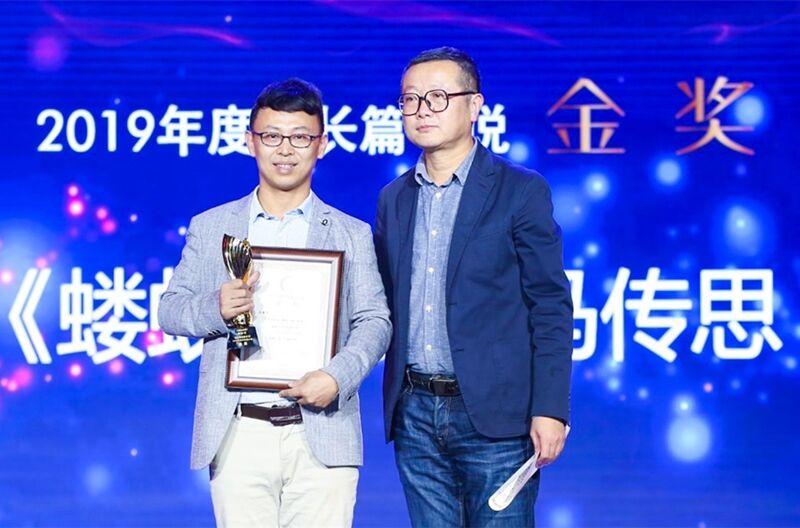Liu Cixin: More quality works needed to grow Chinese sci-fi
- By Zhang Rui
 0 Comment(s)
0 Comment(s) Print
Print E-mail China.org.cn, November 6, 2021
E-mail China.org.cn, November 6, 2021
In an exclusive interview with China.org.cn, China's most famous sci-fi writer Liu Cixin talked about developing Chinese sci-fi, movie, and TV adaptations, "Dune," Hollywood superheroes, and sci-fi for children.

On Chinese sci-fi's global ambition
The first trailer for the Chinese version of the sci-fi epic TV series "Three-Body" was released on Wednesday, igniting great enthusiasm and plenty of online discussion among fans. But this was not the only version that got fans excited. Just days ago, Netflix also announced cast members for their own Hollywood version, including Benedict Wong ("Doctor Strange"), John Bradley ("Game of Thrones"), and Jovan Adepo ("Watchmen").
The novel's writer is Liu Cixin, now 58. In 2015 he became the first Chinese and Asian author to win the Hugo Award for the book, the highest honor bestowed in science fiction and fantasy writing. The book has two sequels - "The Dark Forest" and "Death's End" -- which together make up the "Remembrance of Earth's Past" trilogy. The three-part saga is about how human beings respond to alien invasions.
"According to the royalties I get from publishers, I estimate that 'The Three-Body Problem' has sold 2 million English copies in the world already, which is quite amazing," Liu told China.org.cn in an exclusive interview, while he attended the 12th Chinese Nebula Awards and the Children's Science Fiction Nebula Awards in Chongqing from Oct. 22 - 23.
More than half the copies were sold in e-book format. The other biggest foreign markets were Japan and Germany, he added. So far, the book series has been published in 26 languages.

Though "The Three-Body Problem" has become an iconic brand of Chinese soft power exports, Liu has no clear answer about making Chinese culture more popular overseas. "A bestseller is a one and only event; it can't be repeated," he said. "Other books of mine don't sell so well in foreign countries. So 'The Three-Body Problem' was just blessed to have the opportunity."
The writer admitted the sci-fi genre is more prevalent among foreign readers. "Many words and phrases in sci-fi are from English, so when you translate Chinese sci-fi works, there is less of a cultural gap than the mainstream, local and realistic literature works of China. And science fiction is always about global problems for the entire human race; it's universal and transcends boundaries."
"I think when our country acquires greater strength, it can support Chinese culture to reach more people overseas. And for Chinese sci-fi to go global, you first need to have a great number of excellent works created domestically before reaching out to the world. But, unfortunately, in China, the scope of sci-fi is still small; we still don't have enough writers and readers. So we need a lot more high-quality and influential works and must improve the level of domestic creation."
On sci-fi movies and TV series
By the time Liu sat for an interview with China.org.cn, he had not seen the recent Hollywood sci-fi blockbuster "Dune" yet, but he mentioned he loved the first book of the "Dune" series. He said he doesn't like superhero movies, despite being embedded with sci-fi elements. "I prefer DC to Marvel, if I had to choose."
For movie and TV adaptations of his works, Liu always serves as a consulting producer. Though many fans are concerned that the upcoming adaptations of "The Three-Body Problem might deviate from the book, especially the Netflix version, he has no worries. "I'm involved a little. But I don't have to worry because worry is useless. The adaptation rights are in their hands."

The blockbuster sequel to "The Wandering Earth" started filming recently. The first installment based on his novel grossed 4.68 billion yuan in China in 2019 and has become the most influential sci-fi film ever in China. It was an excellent booster for Chinese sci-fi film development. Since then, more and more Chinese sci-fi movies and TV series have been invested in and produced.
But he offered suggestions to Chinese sci-fi movies and TV series, and he cautioned against relying on dazzling special effects. "Compared with lack of sci-fi writers, I believe China is most seriously lacking sci-fi screenwriters. Most sci-fi movies and TV series are based on novels, but you don't often see original sci-fi screenplays. And sci-fi is not just about top-level visual effects. Only when you tell a good story can you succeed."
On children's sci-fi
Although Liu has no plan to write new stories, he promotes Chinese sci-fi development through various organizations. For example, he serves as the organizing committee chair of this Children's Science Fiction Nebula Awards, the world's first children's science fiction award.

"In the future, children's sci-fi may be the only market for sci-fi literature," Liu predicted. "Adults read fewer and fewer books and have other distractions in work and entertainment, but book reading for children will remain essential."
The writer said writing children's sci-fi is not easy, "you have to be around children to know them and write the books they want. I can't do that because I don't have the chance to be around many children. And children's sci-fi is not a fairy tale; it is about science. But, most importantly, you can't pretend or brag you are a literature master or postmodernist novelist or whatever. If children don't understand or like your book, you'll fail. It's pure and simple."
He suggested that China needs more writers for young children and teens. He also suggested sci-fi should be adapted into new media and multi-media formats because the standard form of a paper book no longer satisfies people.
"It is children who ask the big questions in philosophy, like 'who am I?,' and 'where did the world come from?' They have such an impulse for philosophical exploration. As we grow old, the impulse fades away."






Go to Forum >>0 Comment(s)